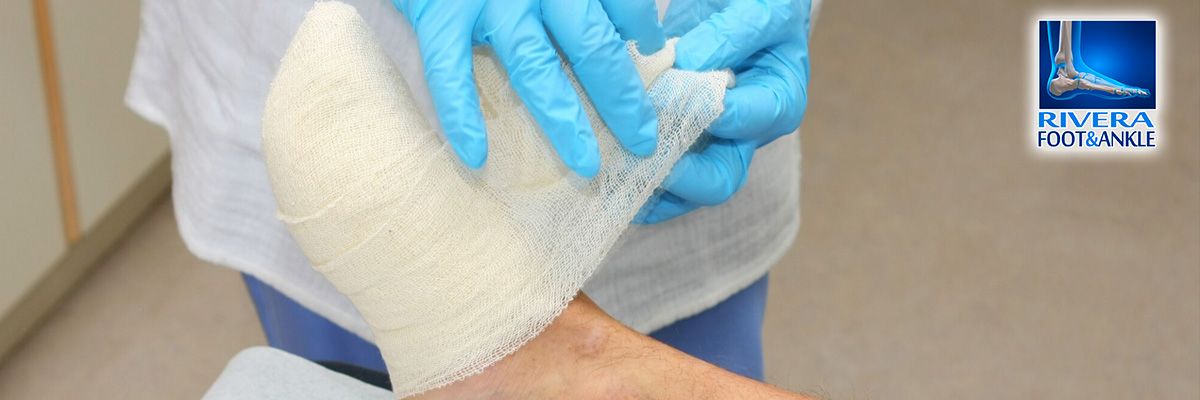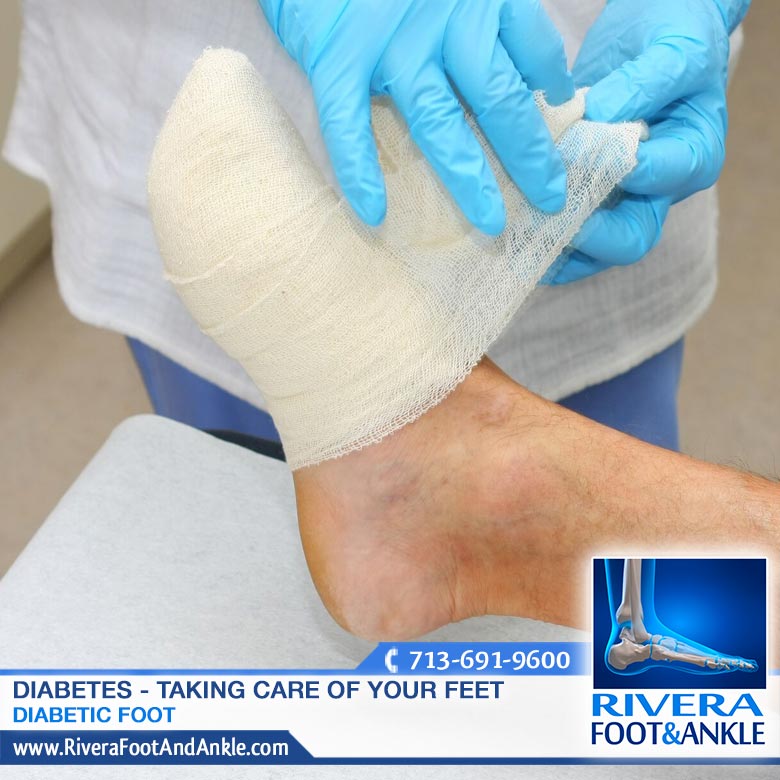
Diabetes - taking care of your feet
Diabetic Foot
Diabetes can damage the nerves and blood vessels in your feet. This damage can cause numbness and reduce feeling in your feet. As a result, your feet may not heal well if they are injured. If you get a blister, you may not notice and it may get worse.
Check your feet every day. Inspect the tops, sides, soles, heels, and between your toes. Look for:
- Dry and cracked skin
- Blisters or sores
- Bruises or cuts
- Redness, warmth, or tenderness
- Firm or hard spots
- If you cannot see well, ask someone else to check your feet.
Call your doctor right way about any foot problems you have. Do not try to treat these problems yourself. Even small sores or blisters can become big problems if infection develops or they do not heal.
- Wash your feet every day with lukewarm water and mild soap. Strong soaps may damage the skin.
- Check the temperature of the water with your hand or elbow first.
- Gently dry your feet, especially between the toes.
- Use lotion, petroleum jelly, lanolin, or oil on dry skin. Do not put lotion, oil, or cream between your toes.
- Ask your health care provider to show you how to trim your toenails.
- Soak your feet in lukewarm water to soften your toenails before trimming.
- Cut the nails straight across. Curved nails are more likely to become ingrown.
- Make sure the edge of each nail does not press into the skin of the next toe.
- Your foot doctor (podiatrist) can trim your toenails if you are unable to.
Most people with diabetes should have corns or calluses treated by a foot doctor. If your doctor has given you permission to treat corns or calluses on your own:
- Gently use a pumice stone to remove corns and calluses after a shower or bath, when your skin is soft.
- Do not use medicated pads or try to shave or cut corns and calluses away at home.
- If you smoke, stop. Smoking decreases blood flow to your feet. Talk to your doctor or nurse if you need help quitting.
- Do not use a heating pad or hot water bottle on your feet. Do not walk barefoot, especially on hot pavement or hot, sandy beaches. Remove your shoes and socks during visits to your health care provider so that they can check your feet.
Shoes and Socks
Wear shoes at all times to protect your feet from injury. Before you put them on, always check the inside of your shoes for stones, nails, or rough areas that may hurt your feet.
Wear shoes that are comfortable and fit well when you buy them. Never buy shoes that are tight, not even it you think they will stretch as you wear them. You may not feel pressure from shoes that do not fit well. Blisters and sores can develop when your foot presses against your shoe.
Ask your doctor about special shoes that can give your feet more room. When you get new shoes, break them in slowly. Wear them 1 or 2 hours a day for the first 1 or 2 weeks.
Change your broken-in shoes after 5 hours during the day to change the pressure points on your feet. Do not wear flip-flop sandals or stockings with seams. Both can cause pressure points.
To protect your feet, wear clean, dry socks or non-binding panty hose every day. Holes in socks or stockings can put damaging pressure on your toes.
You may want special socks with extra padding. Socks that move moisture away from your feet will keep your feet drier. In cold weather, wear warm socks, and do not stay out in the cold for very long. Wear clean, dry socks to bed if your feet are cold.
When to Call the Doctor
Call your doctor if you have any of the following changes to any part of your foot:
- Redness, increased warmth, or swelling
- Sores or cracks
- Tingling or burning feeling
- Pain
Source: medlineplus
RIVERA FOOT & ANKLE: At Orlando H.Rivera DPM, our priority is to deliver quality care to informed patients in a comfortable and convenient setting. When you have problems with your feet, you need to turn to a podiatrist who listens and responds… an experienced doctor who knows the field and can effectively diagnose and treat your needs… a friendly physician who counsels you on the best ways to maintain and improve your health. Our physician(s) meet all these criteria. Plus, you benefit from a dedicated team of trained professionals who give you the individualized attention you deserve.

Diabetic Foot Specialist in Houston.
Foot and Ankle, Dr. Orlando Rivera, Foot and Ankle Podiatry, Houston Foot and Ankle Surgical, Treatment of Foot and Ankle, Foot and ankle specialists, Podiatrist in houston, podiatrist in houston, Orlando H.Rivera DPM, Houston Foot Doctor, Foot and Ankle Surgeon Houston, Ankle and Foot Specialist Houston, Podiatrist Houston, Foot Pain Houston, Best Foot and Ankle Podiatry, Advanced Foot and Ankle Specialist in Houston,Foot and Ankle in Houston, Advanced Foot and Ankle Specialist in Houston, Foot and Ankle Podiatry in Houston, Foot and Ankle Surgical in Houston, Treatment of Foot and Ankle in Houston, Foot and ankle specialists in Houston, Podiatrist in Houston, Foot Doctor in Houston, Foot and Ankle Surgeon in Houston, Ankle and Foot Specialist in Houston, Foot Pain in Houston, Foot and Ankle Surgery in Houston, Foot And Ankle Clinics in Houston



